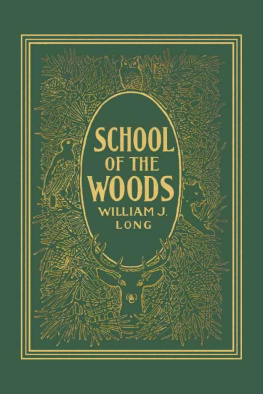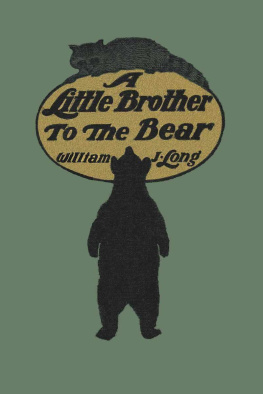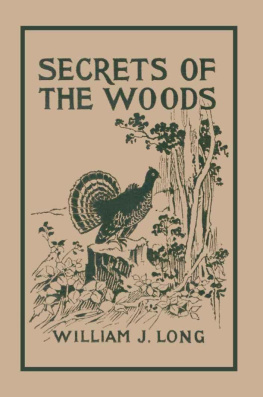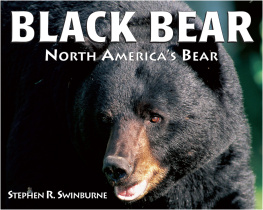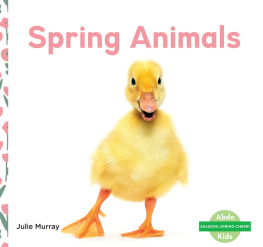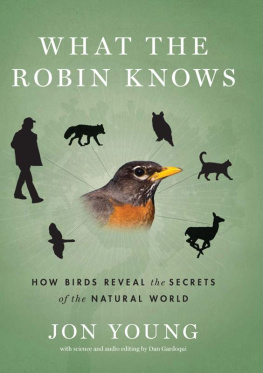School of the Woods
by
William J. Long
Yesterday's Classics
Chapel Hill, North Carolina
Cover and Arrangement 2010 Yesterday's Classics, LLC
All rights reserved. No part of this book may be reproduced or retransmitted in any form or by any means without the written permission of the publisher.
This edition, first published in 2010 by Yesterday's Classics, an imprint of Yesterday's Classics, LLC, is an unabridged republication of the work originally published by Ginn and Company in 1902. This title is available in a print edition (ISBN 978-1-59915-190-8).
Yesterday's Classics, LLC
PO Box 3418
Chapel Hill, NC 27515
Yesterday's Classics
Yesterday's Classics republishes classic books for children from the golden age of children's literature, the era from 1880 to 1920. Many of our titles are offered in high-quality paperback editions, with text cast in modern easy-to-read type for today's readers. The illustrations from the original volumes are included except in those few cases where the quality of the original images is too low to make their reproduction feasible. Unless specified otherwise, color illustrations in the original volumes are rendered in black and white in our print editions.
Preface
Most of the following sketches were made in the woods, with the subjects themselves living just outside my tent door. They are all life studies, and include also some of the unusual life secrets of a score of animals and birds,shy, wild creatures, mostly, that hide from the face of man and make their nests or their lairs deep in the heart of the wilderness.
So far as the sketches have any unity, they are the result of an effort on the part of the writer to get at the heart of things and find the meaning of certain puzzling ways of birds and beasts. A suggestion, at least, of that meaning, and also an indication of the scope and object of this book, will be found in the first chapter, the Introduction to the "School of the Woods."
As in previous volumes, the names herein used for birds and animals are those given by the Milicete Indians. I use these names partly for their happy memories; partly for the added touch of individuality which they give to every creature; but chiefly because they have the trick of bringing the animal himself before you by some sound or suggestion. When you call the little creature that lives under your doorstep, that eats your crumbs and that comes when you whistle certain tunes, a common Toad, the word means nothing. But when Simmo speaks of K'dunk the Fat One, I know something of what the interesting little creature says, and just how he looks.
Two or three of these studies have already appeared in various magazines. All the rest come direct from my old notebooks and wilderness records to these newer pages, where the skillful pencil of my friend Mr. Charles Copeland makes the animals live again and peep at me shyly from behind old mossy logs, or glide away into their leafy solitudes, halting, listening, looking back at me inquisitivelyjust as they did in the wilderness.
WILLIAM J. LONG
Stamford, Conn.,
September, 1902.
Contents
M ANY years ago the writer saw, for the second time, a mother otter teach her unsuspecting little ones to swim by carrying them on her back into the water, as if for a frolic, and there diving from under them before they realized what she was about. As they struggled wildly in the unknown element, she rose near them and began to help and encourage them on their erratic way back to the bank. When they reached it, at last, they scrambled out, whimpered, shook themselves, looked at the river fearfully, then glided into their den. Later they reappeared cautiously; but no amount of gentle persuasion on the mother's part could induce them to try for themselves another plunge into the water; nor, spite of her coaxing and playful rolling about in the dry leaves, would they climb again upon her back that day, as I had seen them and other young otters do, twenty times before, without hesitation.

Now to me, as I went home through the twilight woods thinking it all over, the most suggestive thing in the whole curious incident was this: that I had been taught to swim myself in exactly the same way by a bigger boywith less of help and more of hilarity on his part, and a great deal more of splashing and sputtering on mine, than marked the progress of the young otters.
That interesting little comedy by the quiet river, one of the thousands that pass every day unnoticed in the summer woods, first opened my eyes to the fact that all wild creatures must learn most of what they know as we do; and to learn they must be taught. I have had that fact in mind in gathering together from my old notebooks and summer journals these sketches of animal life, which group themselves naturally about one central idea, namely, the large place which early education holds in the life of every creature.
That animal education is like our own, and so depends chiefly upon teaching, may possibly be a new suggestion in the field of natural history. Most people think that the life of a wild animal is governed wholly by instinct. They are of the same class who hold that the character of a child is largely predetermined by heredity.
Personally, after many years of watching animals in their native haunts, I am convinced that instinct plays a much smaller part than we have supposed; that an animal's success or failure in the ceaseless struggle for life depends, not upon instinct, but upon the kind of training which the animal receives from its mother. And the more I see of children, the more sure am I that heredity (only another name for accumulated and developed instincts) plays but a small part in the child's history and destiny; that, instead, trainingearly trainingis the chief factor; that Loyola, with a profound wisdom in matters childlike, such as the world has rarely seen, was right when he said, in substance: "Give me a child till he is seven years old, and it matters not much who has him afterwards. He is mine for time and eternity." Substitute seven weeks for seven years, and you have an inkling of the unconscious thought which governs every little mother in the wilderness.
To indicate the probable truth of this position, there are certain facts and traits of animal life which are open to even a casual observer in the woods and fields.
Those young birds and animals that are left by sad accident, or sadder willfulness, without their mothers' training profit little by their instincts. They are always first to fall in the battle with the strong. Those alone that follow their natural leaders till they learn wisdom live to grow up in the big woods. Sometimes, in the course of a long summer, birds and animals that see their first offspring well trained produce a second brood or litter. The latter are generally abandoned, at the approach of winter, before their simple education is half completed. Left with their instincts and their imperfect training, they go to feed nature's hungry prowlers; while the better trained broods live and thrive in the same woods, amid the same dangers. Moreover, domestic animals, which have all their wild instincts but none of the wild mother's training, far from profiting by their human association, are almost helpless when, by chance, they are lost or must take up the old, free life of the woods again. Instinct profits them nothing; they can neither catch their food nor hide from their enemies as well as their wilder kinsfolk, and they are the first to go down under the swoop or spring of hawk or wild-cat.

